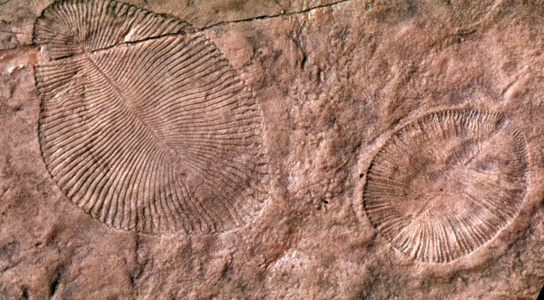
Are these fossils traces of Ediacaran worms or lichen? Credit: Greg Retallack
A new study shows that fossils that have been regarded as ancient sea creatures may have actually been land-dwelling lichen, suggesting life on land began 65 million years earlier than current estimates.
The scientists published their findings in the journal Nature. However, other paleontologists flatly reject the hypothesis made by Gregory Retallack, a geologist from the University of Oregon, in Eugene. His paper marks a dramatic reinterpretation of the fossils and suggests that life on land began 65 million years earlier than researchers had estimated.
The exact nature of the fossils from the Ediacaran period, 635 to 542 million years ago, has been controversial among paleontologists. Some think that the fossils represent some of the earliest complex marine organisms that evolved over 10 million years before the Cambrian explosion, which saw the rapid emergence of major complex animal groups.
Retallack thinks that the fossils are lichens, traces of slime molds, and soil structures. He believes that rock in the Ediacara Member in South Australia, where paleontologist Reginald Sprigg first discovered Ediacaran fossils in 1947, represents new geological data. The rock’s red color and weathering pattern indicate that the deposits were formed in terrestrial environments, not marine ones, and the trails attributed to Ediacaran worms could actually be slime-mold growth.
Some paleontologists dismiss this paper as a summary of the views that Retallack’s has had for the last decade and believe that Retallack hasn’t presented any evidence that would contradict the interpretation that the sedimentary layers involved are marine. Multiple independent laboratories worldwide have nearly universally converged on a marine origin for the Ediacara biota.
Reference: “Ediacaran life on land” by Gregory J. Retallack, 12 December 2012, Nature.
DOI: 10.1038/nature11777









Be the first to comment on "Study Suggests Life on Land Began 65 Million Years Earlier Than Current Estimate"